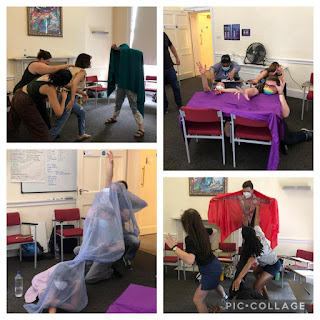"Drama Gives Joy"
I wake up to the clattering of dustbins, reversing trucks restocking Tesco shelves, and the murmur of footsteps as people start trickling through Clerkenwell Green on their daily commute. Since I have a family in tow for this class, I’m living outside of the NYU residence - a stone’s throw from what, I am shocked to learn, used to be “the most disreputable street in London” in Shakespeare’s time. How scandalous!
Early morning in Clerkenwell Green - my little piece of LondonI’m curious to know what people around me make of some of the big ideas I’m grappling with in our class (and in my life), so I figure I’ll straight up ask them. After all, as a community-builder and theatre-maker, I’m interested in the voices and stories of the place where I’m living. I lean into the inevitable awkwardness, embrace the cringe, and approach strangers in Clerkenwell to pose two questions:
What is the most important thing that children and young people should be learning today?
Do you think drama has a role to play in education?
In the limited time I have, I speak with an administrator at the church, a candy shop assistant, the manager of my local Tesco, a pair of garbage collectors, a member of the Roma community who is trying to get back to Romania, a mother with two children, and a random commuter. Here’s what they had to say:
N.b. participants' responses were recorded in video, audio or written form based on their preference.
I’m struck by the repetition of good behavior and practical life skills as answers to the first question. Reassuringly, for the second question, there’s a largely positive response to drama as a way to help personal development as a way of promoting everything from confidence and mental health to understanding human interactions and preparation for real life.
After the vox popping, I dash back for our first class - mercifully starting at 11 but, somewhat traumatically, taking place on Zoom. We’ve had this facilitator - Will Barlow - before and I’m eager to see how he’ll make my brain crackle today. Will gives us an intellectual whistle-stop tour of the key players in the discourse surrounding Drama Education. Quite the shift from yesterday’s burpees and clambering over tables, this morning’s session is all about intellectual heft.
Back in our little Zoom boxes
We start in the early 1900s and travel through ideas of drama as play, self-expression, personal development, and social and emotional learning until we arrive at a place where “theatre has no rules”! Along the way, Will names methods (like “the conventions”) and unpacks concepts (like drama as “meaning-making”), which bring me some clarity. There’s a lot of emphasis on Teacher-in-Role and debates over things like process vs. product in the drama classroom as Will pits heavyweight scholars against each other in the academic ring. In the end, I’m drawn to the idea of using a “palette” of dramatic techniques to find what works for us. I also like that young people should have access to these techniques so that they can lead this work, too.
Our afternoon class is back in person with Theo Bryer, who trains teachers of English and Drama. She models many strategies that Will had just lectured about. Two hours fly by as our class is immersed in a process drama that explores being an outsider through the gothic genre lens. I really enjoyed her layering of world-building exercises to set the scene (stimulating our collective imagination through the senses and her theatrical adoption of teacher-in-role).
I felt moments of wonderment in Theo’s session. There were glimmerings of the magic of collective storytelling and discovery that I love about theatre. The admin assistant I interviewed at the church summed it up pretty well after all: when it works, “drama gives joy.”







Comments
Post a Comment